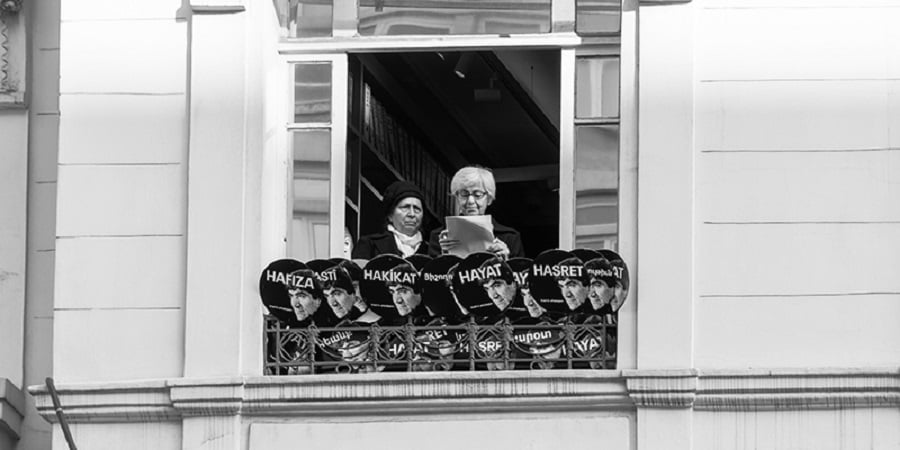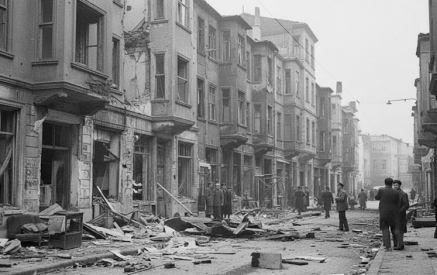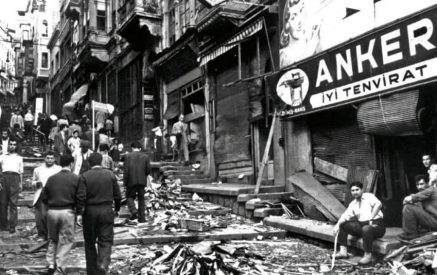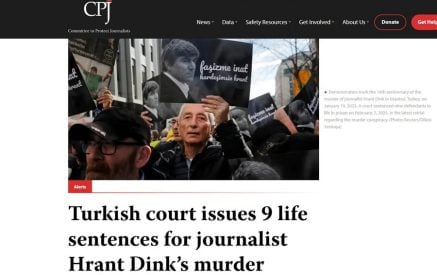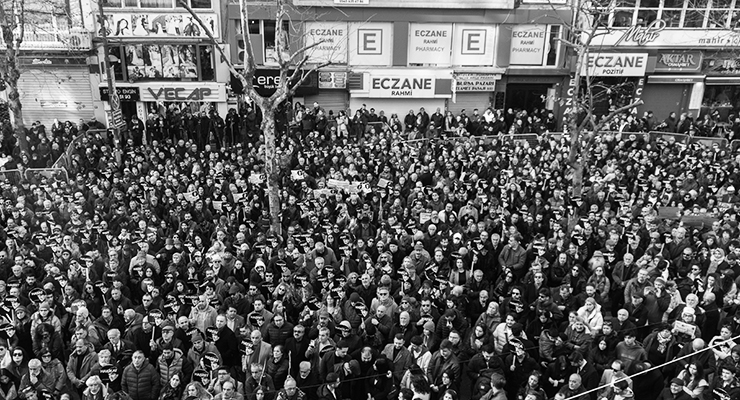Hrant Dink, who was assassinated 18 years ago in front of the Sebat Building, where Agos Newspaper’s former office was located, was commemorated by thousands of people on Sunday, January 19, at 15:00.
At the commemoration, Tülin Özen read a letter from Çiğdem Mater, who has been imprisoned since April 2022 as part of the Gezi trial, sent from Bakırköy Prison. In her letter, Çiğdem Mater wrote: “Today, I am sure there are those in front of the Sebat Building who were not yet born when Hrant was killed. Generations are changing, but the answer to the question ‘Where are we?’ draws its strength from persistently being here. We are still here, stubbornly.”
Erarslan Sağlam read a message from Osman Kavala, who has been unlawfully detained since November 2017. Kavala conveyed: “Despite murders, massacres, and all forms of tyranny, I continue to hope that we will see days when peace and justice prevail. I demand justice for Hrant and for all our citizens.”
At the commemoration where calls for justice were persistently voiced, this year’s address was delivered by Takuhi Tovmasyan, one of the leading figures in Armenian cultural writing.
Read also
In her speech, Takuhi Tovmasyan said: “What was his ‘crime’? It was obvious: a love of human beings, a passion for democracy and human rights, a firm belief in freedom of expression, and on top of all this, advocating for peace between two peoples, calling for the opening of the [sealed] Turkey-Armenia border… And above all of this, he possessed a God-given gift to persuade others, which scared some to their core.”
The ceremony, broadcast live in Turkish and English over the internet, was viewed by thousands of people. You can access the recording of the commemoration live-stream here.
Takuhi Tovmasyan’s address:
“My dearest Hrant,
My dearest brother,
It’s been 18 years since that dreadful Friday of January 19th, 2007. On each and every January 19th, thousands of kindred spirits have gathered right here to commemorate you. Every year, people whom you also hold dear have addressed you from this very window. They talked about your love for human beings, the earth, justice, democracy, and your passion for peace and freedom. They cursed the hands that dared to touch you; they cursed the climate that paved the way for these hands. After 18 years, we still, and will always, keep cursing altogether. My dearest brother, my beautiful Hrant… This year, your beloved friends, Friends of Hrant, asked me to do the commemoration address and talk to you from this window. How could I have possibly said, “No, I cannot make it”? After all, I, as Takuhi, have always been there for the beautiful young people of Aras and Agos. I said, “For sure.” I said yes, but it’s easier said than done!
There is no distinction between old pain and new pain; pain simply exists as it is. As if the pain of your loss weren’t enough, I now endure a renewed ache of losing a brother. Forty days ago, I took Tomo to Balıklı Cemetery and, with my own hands, buried him in the bosom of the Tovmasyans—just two steps away from you. He rests next to your friends Torkom Beşiktaşlıyan and Sarkis Çerkezyan, lying a few steps further away next to the Armenian Victims’ Memorial, and poets Misak Medzarents and Garbis Cancikyan resting in the adjacent graves. I laid him to rest with my grandpa Ghazaros, grandma Takuhi, their sons Sarkis and Bedros, and their daughters-in-law Sirvart and Mari, in the earth of the Tovmasyans.
Every time I visit the cemetery, every time I remember the loved ones I have lost, and every time I cook semolina halwa to honor the soul of my dearest people, my heart aches with the painful memory of my great uncle Mardig. My dearest Hrant, our hearts would cherish the same joy and would suffer the same pain, yet it seems to me that there was always more pain and less joy. Whenever we came together, the songs were laden with sorrow. When Rakel sings the folksong with her poignant voice, “Yes pılpul yem, mi pun unem, mi pun unem, sarin e, sirdıs pots e, sirdıs khots e, meçi likı arin e,” translated as “I am a nightingale, I have a nest, out there on the mountain, there is a fire in my heart, and scars in my heart, full with blood,” the century-old painful sufferings of our ancestors, whether shared or unshared, find their voice.
I have felt a daring urge to put an end to this lament carried over from one generation to another. It was 20 years ago, and out of courage of ignorance. I completely forgot that every 10 or 20 years in these lands, new plots are devised to revive our painful sufferings. I said to myself: My grandma Takuhi left a painful legacy to my father Bedros, and from him, I inherited this unbearable pang of conscience. I shall not pass it on to my children after 90 years. Let them grow up in these lands and enjoy their good days – heaven forbid they endure what we suffered.
What kept hurting my grandma Takuhi’s conscience, dear friends, let me tell you:
In her late 20s, my grandma Takuhi from Çorlu agreed to marry my grandpa Ghazaros Efendi. Before Takuhi, my grandpa Ghazaros had been married to a beautiful woman from Çorlu named Sofig. They had three children named Mardig, Garbis and Aghavni. At that time, the family moved from Çorlu to Istanbul, settling in Yedikule. Yet, Sofig yaya passed away at a young age due to tuberculosis, leaving Grandpa Ghazaros a widower with three kids. He decided to remarry and started looking for a bride from their hometown Çorlu. His relatives joined forces, convinced Takuhi and got them betrothed. So as not to intimidate the bride-to-be, Ghazaros Efendi downplayed the number of his own kids, and passed her the message that he had two children instead of three. The newly-wed Takuhi only saw the kids upon arriving in Yedikule from Çorlu, and said “You told me that there were only two, and I accepted that. Had you not deceived me, I would have accepted three. Now that the truth is all-out, I will only care for two of them as my own, but the third must return to Çorlu with his grandparents after the wedding to live and grow up there”.
Takuhi Hanım, my grandma, kept her promise. She took the two children of Ghazaros Efendi into her heart, loving them dearly, and raising them. Meanwhile she also gave birth to two. My father Bedros was born in 1911, and my uncle Sarkis in 1913. Grandma Takuhi’s joy lasted only for 5-6 years. The calendar already marked the cursed year of 1915. Some might wonder why that matters. I know. On one side, you have places like Adana, Sivas, Kayseri, Van, Erzurum, Erzincan, and on the other, the Thrace, Çorlu, Silivri, Tekirdağ, Malkara… After all, the Armenians living in the war zones were to be deported for the sake of their own safety, right? Has anyone ever committed a crime? Has anyone ever been sentenced [for a wrongdoing]? What’s the point of collectively punishing an entire people? To keep the long story short, my uncle Mardig who was a child back then, alongside his entire family, and the Armenian community of Çorlu and Thrace, was forced to embark on a journey that was officially called “deportation”. Since that very date, grandma Takuhi never knew how to smile again. She went on to raise her children, yet she always kept thinking of the little Mardig she had rejected.
Months and years went by, yet grandma Takuhi never lost her hope of finding him alive. She did everything in search of him, but to no avail. No one had ever known of him or seen him. Mardig should be a grown man by now; he should have become a lad. Who would ever know? Perhaps he became the adopted son of a family, perhaps he was assimilated as a Kurd or a Turk, or perhaps he grew up in one of the orphanages run by American missionaries… My grandma never considered the likelihood of Mardig being dead. By 1957, when she passed away at the age of 80 due to sarcoma, she had endured immense suffering, much like all the daughters and sons of her people, yet none of these sufferings were as painful as her pang of conscience.
My father Bedros shouldered this sorrowful legacy from my grandma. He kept writing letters addressed to Armenians scattered all over the world, and searched tirelessly for Mardig. He also departed in disappointment in 1975, never finding a single trace of his [step]brother. As for me, I inherited this pang of conscience from my grandma and my father. At 23, I cooked semolina halwa for the soul of my father. It was utterly difficult. I wept a lot. In my grief, I found a way to hold onto [the life], I started talking to my father, as if he were alive and sitting right across from me. I would ask him questions, and I would answer instead of him. These ‘conversations’ started helping me out. Every time I cooked semolina halwa, I remembered him and his loved ones. And I came to think and believe that this gesture of mine brought him happiness in his resting place.
Fast forward to the 80th anniversary of 1915…I suddenly thought of my uncle Mardig, although I did not have the courage to think of him when I cooked semolina halwa for the soul of my father and my loved ones. I made a decision. I would come to terms with this pang of conscience I inherited from my grandpa and my father, and I would not pass this heavy burden onto my children. Even if my uncle Mardig had survived and lived somewhere, he would have been gone by now. I resorted to what I know best: I cooked semolina halwa for his soul. From that moment on, every time I cook semolina halwa, I do remember uncle Mardig and I ask those tasting it to commemorate him as well. I believed that in this way, grandma Takuhi would finally find peace in her resting place, my father who departed in disappointment and on watch would finally close his eyes, and most notably, I would find peace of mind in not passing on a painful legacy to my children.
And I had it all. It was such a relief, don’t even ask about it… Remember I’ve just mentioned the courage of ignorance? This perfectly describes how things transpired. In 2007, on the 19th of January, on a Friday just around this time, right here, they shot down my dearest soulmate Hrant… Imagine, I was doting on my children, my nephews and nieces, all the young ones, so that they no longer hear the painful stories we inherited from our elders, so that they could live to the fullest and in joy in these lands. How could I have dared to be so ignorant? In broad daylight, right in the heart of Istanbul, right before our eyes, they assassinated an Armenian journalist.
What was his ‘crime’? It was obvious: a love of human beings, a passion for democracy and human rights, a firm belief in freedom of expression, and on top of all this, advocating for peace between two peoples, calling for the opening of the [sealed] Turkey-Armenia border… And above all of this, he possessed a God-given gift to persuade others, which scared some to their core.
My dearest Hrant, it’s been 18 years. Just as grandma Takuhi could not accept uncle Mardig’s death, I cannot and will not believe in your passing; I simply cannot accept it, and I cannot bring myself to cook semolina halwa for your soul! My heart aches, just as it did on the first day. I have been racked with so much pain, but then I figured that I have found solace to cope with this unbearable pain. See, my beautiful brother, you have my word. You lived your life for a dream, a dream you put all your heart, mind, and breath into. You know, that [sealed] border gate… If and when it opens, I will grab my copper pot inherited from my grandma Takuhi and cook semolina halwa right at the opened gate.
I don’t know if I will be alive to witness the day when your dreams come true… But if I am, I will keep my promise. This is the only thought that gives me solace. So much so that at times I get so carried away, and nurture this dream of mine. I envision cooking cauldrons of semolina halwa, not just one, but dozens. For all the souls, who lost their lives or [rather] whose lives were taken for pursuing an idea, for pursuing a dream…
My dearest brother, every time we sat together dreaming, your eyes radiated brightness, your heart beamed with joy. I vividly remember. And then every time I land from my realms of a dreamland down to the real world, I remind myself “come to your senses Takuhi”. Didn’t your brother also say: “in this country nobody ever hurts doves”…And look, what happened? Didn’t they hurt the most open hearted of all doves? It’s not because I am doubting my age, or my health here. Yet, I do not believe that I myself will witness that day. Regrettably, to me, it feels like these days are just so far away. Yet, I want to believe that you will be able to bear witness to that day. So here is my last will to you. Please make my dream come true, and when that day comes, cook semolina halwa on my behalf. Take your pans and pots, go to the border gate in Kars, serve the halwa to the people on both sides of the bank. And do not stop there. When peace finally arrives in this country, go to each and every border gate, to Habur, Sarp, İpsala, Kapıkule, Karkamış, Ceylanpınar, and cook semolina halwa accompanied by your prayers in every language. Serve it to the peoples on both sides of the borders.
See, even the sheer idea of this dream has given me some relief. I wholeheartedly wish that you will be able to live this for real. Thank you all so much.”
On the evenings of January 18 and 19, a video projection titled “Liberating Promise”, prepared by Memed Erdener in memory of Hrant Dink, was displayed on the exterior façade of the Sebat Apartment.
Since 2019, video projections in memory of Hrant Dink have been created by Ümit Kıvanç from 2019 to 2023, and by Hale Tenger in 2024.



















































